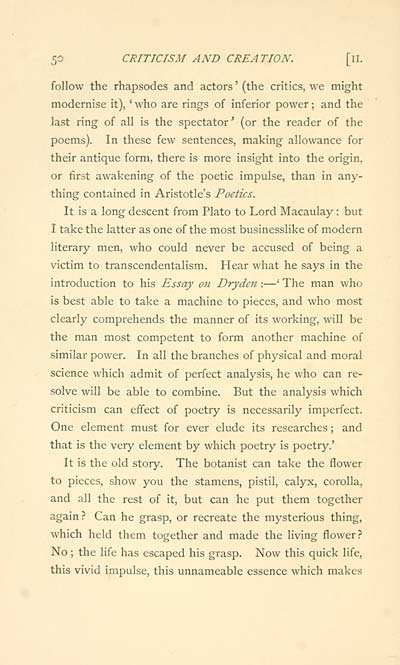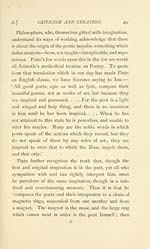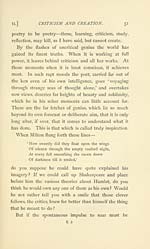Download files
Complete book:
Individual page:
Thumbnail gallery: Grid view | List view

^O CRITICISM AND CREATION. [ll.
follow the rhapsodes and actors ' (the critics, we might
modernise it), ' who are rings of inferior power ; and the
last ring of all is the spectator' (or the reader of the
poems). In these few sentences, making allowance for
their antique form, there is more insight into the origin,
or first awakening of the poetic impulse, than in any-
thing contained in Aristotle's Poetics.
It is a long descent from Plato to Lord Macaulay : but
I take the latter as one of the most businesslike of modern
literary men, who could never be accused of being a
victim to transcendentalism. Hear what he says in the
introduction to his Essay on Dryden : — ' The man who
is best able to take a machine to pieces, and who most
clearly comprehends the manner of its working, will be
the man most competent to form another machine of
similar power. In all the branches of physical and moral
science which admit of perfect analysis, he who can re-
solve will be able to combine. But the analysis which
criticism can effect of poetry is necessarily imperfect.
One element must for ever elude its researches ; and
that is the very element by which poetry is poetry.'
It is the old story. The botanist can take the flower
to pieces, show you the stamens, pistil, calyx, corolla,
and all the rest of it, but can he put them together
again? Can he grasp, or recreate the mysterious thing,
which held them together and made the living flower?
No ; the life has escaped his grasp. Now this quick life,
this vivid impulse, this unnameable essence which makes
follow the rhapsodes and actors ' (the critics, we might
modernise it), ' who are rings of inferior power ; and the
last ring of all is the spectator' (or the reader of the
poems). In these few sentences, making allowance for
their antique form, there is more insight into the origin,
or first awakening of the poetic impulse, than in any-
thing contained in Aristotle's Poetics.
It is a long descent from Plato to Lord Macaulay : but
I take the latter as one of the most businesslike of modern
literary men, who could never be accused of being a
victim to transcendentalism. Hear what he says in the
introduction to his Essay on Dryden : — ' The man who
is best able to take a machine to pieces, and who most
clearly comprehends the manner of its working, will be
the man most competent to form another machine of
similar power. In all the branches of physical and moral
science which admit of perfect analysis, he who can re-
solve will be able to combine. But the analysis which
criticism can effect of poetry is necessarily imperfect.
One element must for ever elude its researches ; and
that is the very element by which poetry is poetry.'
It is the old story. The botanist can take the flower
to pieces, show you the stamens, pistil, calyx, corolla,
and all the rest of it, but can he put them together
again? Can he grasp, or recreate the mysterious thing,
which held them together and made the living flower?
No ; the life has escaped his grasp. Now this quick life,
this vivid impulse, this unnameable essence which makes
Set display mode to: Large image | Transcription
Images and transcriptions on this page, including medium image downloads, may be used under the Creative Commons Attribution 4.0 International Licence unless otherwise stated. ![]()
| Early Gaelic Book Collections > Ossian Collection > Aspects of poetry > (66) |
|---|
| Permanent URL | https://digital.nls.uk/78386064 |
|---|
| Description | Selected books from the Ossian Collection of 327 volumes, originally assembled by J. Norman Methven of Perth. Different editions and translations of James MacPherson's epic poem 'Ossian', some with a map of the 'Kingdom of Connor'. Also secondary material relating to Ossianic poetry and the Ossian controversy. |
|---|
| Description | Selected items from five 'Special and Named Printed Collections'. Includes books in Gaelic and other Celtic languages, works about the Gaels, their languages, literature, culture and history. |
|---|

